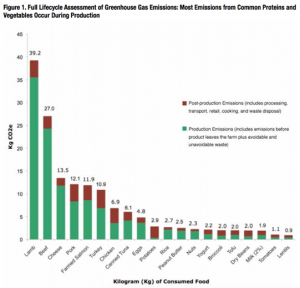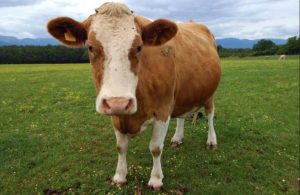Food systems are responsible for a large portion of global carbon emissions. From production and processing, to shipping, storing and cooking, this aspect of human activity accounts for some 19-29% of global greenhouse gas emissions, but there are some very small lifestyle changes one can make to heavily reduce this carbon footprint.
The obvious first step might be to go vegetarian or vegan. Since the livestock sector is a major contributor of greenhouse gas emissions – with some sources saying it accounts for up to 14.5% globally – diets that limit the consumption of animal products have the lowest impact. But I think that for many people, food is a big part of their culture and identity, which can make the idea of switching to a vegetarian or vegan diet all at once a bit intimidating. Is there a smaller first step? What are the smallest diet changes one could make that would have the largest impact?
1. Eat less beef
An assessment by the Environmental Working Group found that of the most common foods, beef and lamb products cause the most CO2 emissions over their lifecycle, by a huge margin. One kilogram of lamb produces 39.2kg of CO2, and a kilogram of beef produces 27.0kg. To put this in perspective, since a gallon of gasoline creates around 9.2kg of CO2, each quarter-pound beef burger you eat is equivalent to burning a third of a gallon of fuel. And a 4oz serving of lamb is equivalent to a half-gallon. Clearly, this is not good. As far as meats go, chicken is the best alternative, with nearly four times less of an impact than beef. Pork and turkey are also significant improvements. But if you are worried that you’ll begin to miss the unique taste of beef, fear not: plant-based substitutes are making rapid progress as we speak (look up “The Impossible Burger”).

2. Don’t waste food
It seems obvious to most people why they shouldn’t waste food: wasted food is wasted money. But few people know that food waste is a serious contributor to climate change. According to the Washington Post, “30 percent of food is wasted globally across the supply chain, contributing 8 percent of total global greenhouse gas emissions.” If global food waste were a country, it would be the third largest contributor behind China and the US. While much of this waste comes from the supply chain, consumers can still make a difference with their choices: wasting less food causes one to purchase less food, and thereby this drop in demand ripples down the chain.
I think that these small lifestyle changes are more accessible to people who are concerned about their impact, but who are hesitant to make radical changes. It is far easier to convince somebody just to eat less beef, or to explain the importance of limiting food waste, than it is to have them reshape their entire diet. Often it’s the first step that is the hardest to overcome, and by emphasizing the most simple and impactful diet changes, we can begin to move toward more sustainable food systems one baby step at a time.
– Ethan Kohrt

Sources:
http://static.ewg.org/reports/2011/meateaters/pdf/methodology_ewg_meat_eaters_guide_to_health_and_climate_2011.pdf
https://www.annualreviews.org/doi/full/10.1146/annurev-environ-020411-130608
http://static.ewg.org/reports/2011/meateaters/pdf/methodology_ewg_meat_eaters_guide_to_health_and_climate_2011.pdf
https://www.epa.gov/ghgemissions/sources-greenhouse-gas-emissions#agriculture
https://www.chathamhouse.org/publication/livestock-climate-change-forgotten-sector-global-public-opinion-meat-and-dairy